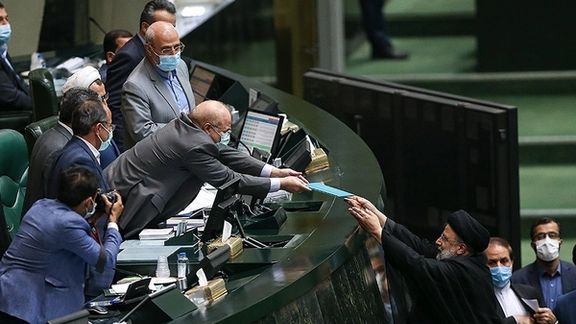New Budget Bill Means Even More Inflation For Iranians

A leading economic daily in Tehran says the main implication of Iran's new budget bill for ordinary people would be higher inflation in the months to come.

A leading economic daily in Tehran says the main implication of Iran's new budget bill for ordinary people would be higher inflation in the months to come.
Donyaye Eghtesad (World of Economy) has highlighted the elimination of cheap dollars government has been providing to importers of food and medicine as the main factor, which will boost prices.
The government's annual budget bill for the new Iranian year that starts on March 21,2022 was handed over to the parliament for ratification on Sunday. Usually, the bill will undergo dramatic changes before it takes its final shape probably in February or March.
During the past two years, the parliament and the government had so many problems over the annual budget that their debates remained inconclusive after several weeks and Supreme Leader Khamenei handed over the ratification of the bill to the heads of the executive, judiciary and legislative powers.
This year, political analysts have said that debates over the budget are likely to widen the gap between the parliament and the presidential administration more than ever before. The Majles Speaker, and the parliament's biggest fraction, the Paydari Party members are preparing to fight over the lion's share of the budget.
Last year a deputy Majles Speaker charged that Speaker Mohammad Bagher Ghalibaf made changes in the budget numbers after its final ratification. But the matter was pushed under the carpet to avoid further controversy.
According to Donyaye Eqtesad the delaying of retirement age will be raised to take some pressure off from the Social Security Organization. The organization has been facing problems in recent years as cash from the pension fund was diverted into some failed business activities, reducing available cash.
Olia Alibeigi, a member of the trustees of the organization has charged in an interview with the Iranian Labor News Agency (ILNA)on Monday that successive government and the parliament in Iran think they can withdraw money from the pension fund whenever they need to solve other economic problems.
Meanwhile, observers say an average 10 percent salary increase for government employees amid 50-percent inflation, will add to dissatisfaction among the workers. On Monday, thousands of Iranian teachers clashed with the police near the parliament after security agents attacked protesters who wanted a pay adjustment to make up for the impact of the country's back-breaking inflation. Not only government office workers are affected but millions of workers in state-owned industries.
Social media users in Iran have pointed out that the 10 percent raise for government employees is ridiculous while Raisi has proposed a 300-percent increase for the expenses of the Presidential Office.
Meanewhile, many economists argue that not providing cheap dollars to importers of essential goods, may save around $8 billion annually. But the problem is that many in parliament, economists and politicians say this would add fuel to inflation, which has already reached 45 percent this year.
Rising inflation, small salary increases and the amount of tax the government is planning to collect from citizens are likely to exert immense pressure on the nation. Experts talking to Iran International Television during Sunday and Monday predicted that one of the implications of the new budget bill is the increased likelihood of protests in Iran.